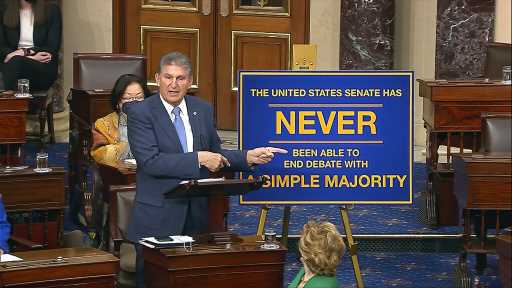
Senate Republicans Again Block Voting Rights Legislation As Democrats’ Move To Modify Filibuster Rules Likely To Fall Short
The Senate blocked voting rights legislation, as expected, even as Democratic lawmakers and President Joe Biden warned that no less than the preservation of democracy was at stake.
During the day on Wednesday, a parade of Senate Democrats gave impassioned speeches on the Senate floor to highlight the need for the legislation to counter GOP-led moves to restrict voting in a number of states.
The vote, 49-51, was short of the 60 necessary under filibuster rules to end debate and move the bills forward. Senate Majority Leader Chuck Schumer (D-NY) switched his vote at the last minute, a procedural maneuver so that the legislation could be brought up again.
Schumer next plans to schedule a vote to change the rules of the filibuster so that the legislation could move forward with a simple majority, rather than a 60-vote threshold. But Democrats don’t have enough votes to make such a move, with Sen. Joe Manchin (D-WV) and Sen. Kyrsten Sinema (D-AZ) opposing the changes and all Republicans likely against it.
Related Story
Kyrsten Sinema Says She Opposes Filibuster Rules Change Needed To Pass Voting Rights Legislation
In her remarks to the Senate, Sen. Amy Klobuchar (D-MN) cited the rollback of same-day voter registration in Montana and voting restrictions passed in Georgia.
“For every one of these laws passed, in 19 states, it has been by a simple majority,” she said.
The Freedom to Vote Act: The more sweeping of the two bills would establish early vote requirements and vote-by-mail standards; protect local election officials from removal for political reasons; ban gerrymandering; create automatic voter registration standards; increase campaign finance disclosure; and mandate post election audits. It also would make Election Day a national holiday and would limit polling place lines to no more than 30 minutes, among other changes.
The John Lewis Voting Rights Advancement Act: The legislation would require that states get clearance from the federal government to certain changes to their voting laws, essentially restoring a provision of the Voting Rights Act of 1965. A state would be subject to “pre-clearance” for 10 years if: there were 15 or more voting rights violations in the state during the previous 25 years; 10 or more violations occurred during the previous 25 years, with at least at one committed by the state itself; or three or more violations in previous 25 years and the state administers the elections. The bill also would set factors that courts must consider when hearing challenges to a state or locality’s voting practices.
Must Read Stories
Michael Mann-Meg Gardiner Book ‘Heat 2’ Follows Characters Before & After Movie; Pub Date Set
Robert Pattinson Circling Bong Joon Ho Pic At Warner Bros With Plan B Producing
Los Angeles On-Location Filming Sets Quarterly Record, Doubling Since 2020
Anthony Mackie Sets Directing Debut On ‘Spark’ With Saniyya Sidney As Claudette Colvin
Read More About:
Source: Read Full Article



